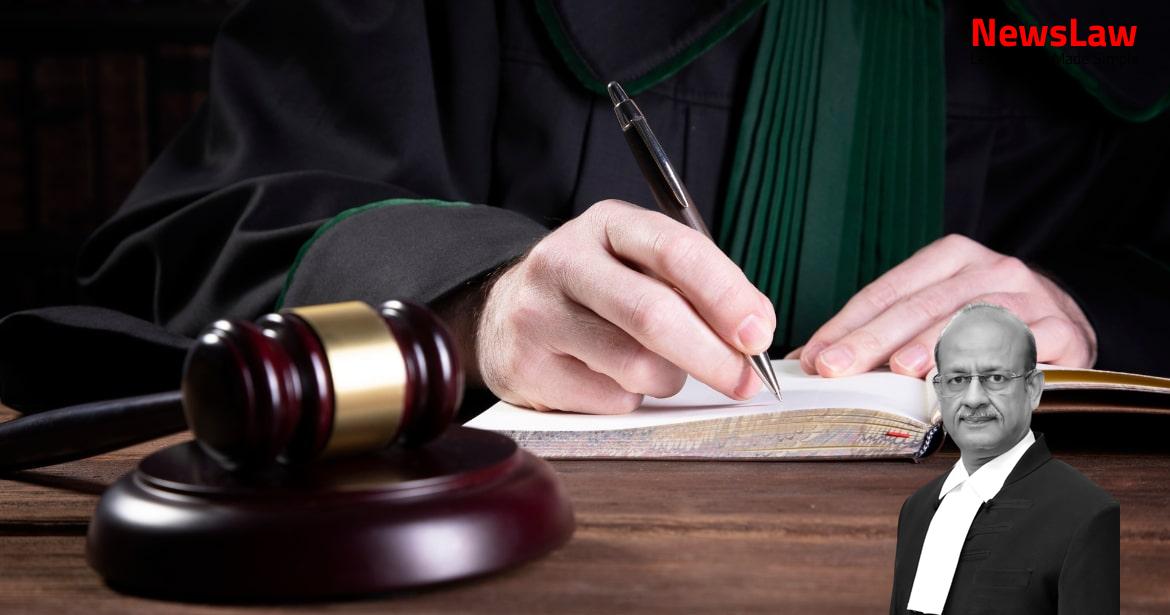In the case of Rajeev Savara v. State of Maharashtra & Ors., the appellant, Rajeev Savara, has challenged the FIR filed against him, claiming innocence and lack of disclosure of a cognizable offence. The High Court recently dismissed Savara’s Criminal Writ Petition on grounds that the allegations in the FIR do not constitute the necessary elements for the offenses under Sections 153A and 504 IPC. Stay tuned for more updates on this legal matter.
Facts
- The appellant, Shri Rajeev Savara, claimed to be an internationally recognised domain expert of pre-modern, modern visual and decorative Indian arts.
- He founded the Savara Foundation and served as the Chairman of the Board of Trustees.
- He filed a Criminal Writ Petition challenging an FIR, claiming innocence and that no cognizable offence was disclosed.
- The complaint alleged blackmail through a defamatory news article regarding land ownership and an event scheduled on 20 March, 2020.
- An FIR was registered against the accused for alleged offences related to the news article.
- The complaint involved the planned foundation stone laying ceremony of ‘Matra Ashraya-A collection museum’ on the disputed land.
- The accused’s actions caused damage to the complainant’s reputation and standing in society.
- The complainant did not appear in the matter despite notices being served.
- The appellant calls into question the order of the High Court dismissing the Criminal Writ Petition.
- Counter affidavit states no offence found against the newspaper and its officials during the investigation.
- The news article in question was based on a Facebook post by journalist Gunanand Jakhmola.
- The appellant, as the Director of the e-newspaper Parvatjan, argued that he should not be held liable for the publication.
- The High Court dismissed the criminal writ petition filed by the appellant on 20 July, 2020.
Also Read: Challenges in Legal Analysis of NDPS Act Case
Arguments
- Appellant’s counsel argued that admitted allegations in the FIR do not fulfill the necessary elements for the offenses under Sections 153A, 504 read with Sections 34 and 120B IPC.
- No communal, caste, religion, or race-based imputations found in the news article on the online news portal of Parvatjan, hence Section 153A IPC offense not established.
- Appellant accused of misusing criminal law by filing a frivolous FIR according to the counsel.
- Counsel suggested that if the complainant felt defamed by the news article, the appropriate remedy would have been a defamation complaint.
- News article contents not promoting enmity or hatred between groups; lacking proper fact-finding exercise as per the complainant.
- Complainant claimed imputations in the article tarnished their reputation with intent to incite breach of peace.
- Investigation revealed offenses under Sections 153A, 504 IPC read with Sections 34 and 120B IPC applicable, while Sections 500 and 501 IPC charges dropped.
- Petitioner urged for the quashing of the FIR and subsequent proceedings, as no clear involvement of multiple groups, but rather a report on a disputed land matter.
- Offence under Section 504 read with Sections 34 and 120B IPC applied by Investigating Officer
- Journalist Gunanand Jakhmola stated that his Facebook post had been manipulated
- Allegation that the post created a sense of enmity and disharmony between hill community and people of plains
- Learned standing counsel for the State opposed the appellant’s counsel’s submissions
- Possibility of offence under Section 153A IPC due to publication of false news creating strife between hill and plains people
- Investigation may extend beyond current FIR based on allegations
- Stand taken that interference with impugned order is not warranted
Also Read: Landmark Legal Analysis on Cancellation of Bail Orders
Analysis
- The news article in question does not refer to any group or community.
- Allegations in the FIR do not constitute any cognizable offense under Sections 153A and 504 IPC.
- The FIR lacks necessary elements for the offenses under Sections 34 and 120B IPC.
- Illustrative categories where power under Article 226 or Section 482 of the Code could be exercised are provided.
- The FIR lacks allegations suggesting provocation towards disturbing public peace or committing offenses.
- Complainant’s allegations in the FIR do not support the offense under Section 153A IPC.
- The substantive offenses retained against the appellant are Sections 153A and 504 read with Sections 34 and 120B IPC.
- Foundational facts essential for the offense under Section 153A IPC are absent from the allegations in the FIR.
- The news post does not support the allegation of blackmail as mentioned in the FIR.
- Contents of the news article are focused on the complainant being prejudicial to the hills.
- In the case of Manzar Sayeed Khan v. State of Maharashtra and Anr., two or more groups or communities must be present for applying Section 153A IPC, which was not the case in the present situation.
- No allegation in the FIR suggested that the accused attempted to extract any wrongful gain or valuable security from the complainant based on the mischievous/malicious post.
- Referring to the case of State of Haryana and Ors. v. Bhajan Lal and Ors., specific principles were outlined for the scope of High Court powers in quashing criminal proceedings under Article 226 of the Constitution of India and Section 482 CrPC.
- The continued proceedings from the impugned FIR against the appellant were deemed a gross abuse of process of law because the allegations did not disclose the necessary ingredients of a cognizable offence.
- Various scenarios were presented where the allegations in an FIR do not constitute a cognizable offence, leading to the prohibition of investigation without a Magistrate’s order.
- Allegations in the FIR and accompanying materials must disclose a cognizable offense for police investigation under Section 156(1) of the Code.
- Exception for investigation by police without Magistrate’s order is under Section 155(2) of the Code.
- Magistrate’s order is required if the FIR does not disclose a cognizable offense.
Also Read: Refund of Excess Payments Legal Analysis
Decision
- Pending application(s) disposed of
- Appeal allowed
- Impugned FIR quashed and set aside
Case Title: SHIV PRASAD SEMWAL Vs. THE STATE OF UTTARAKHAND (2024 INSC 220)
Case Number: Crl.A. No.-001708-001708 / 2024



